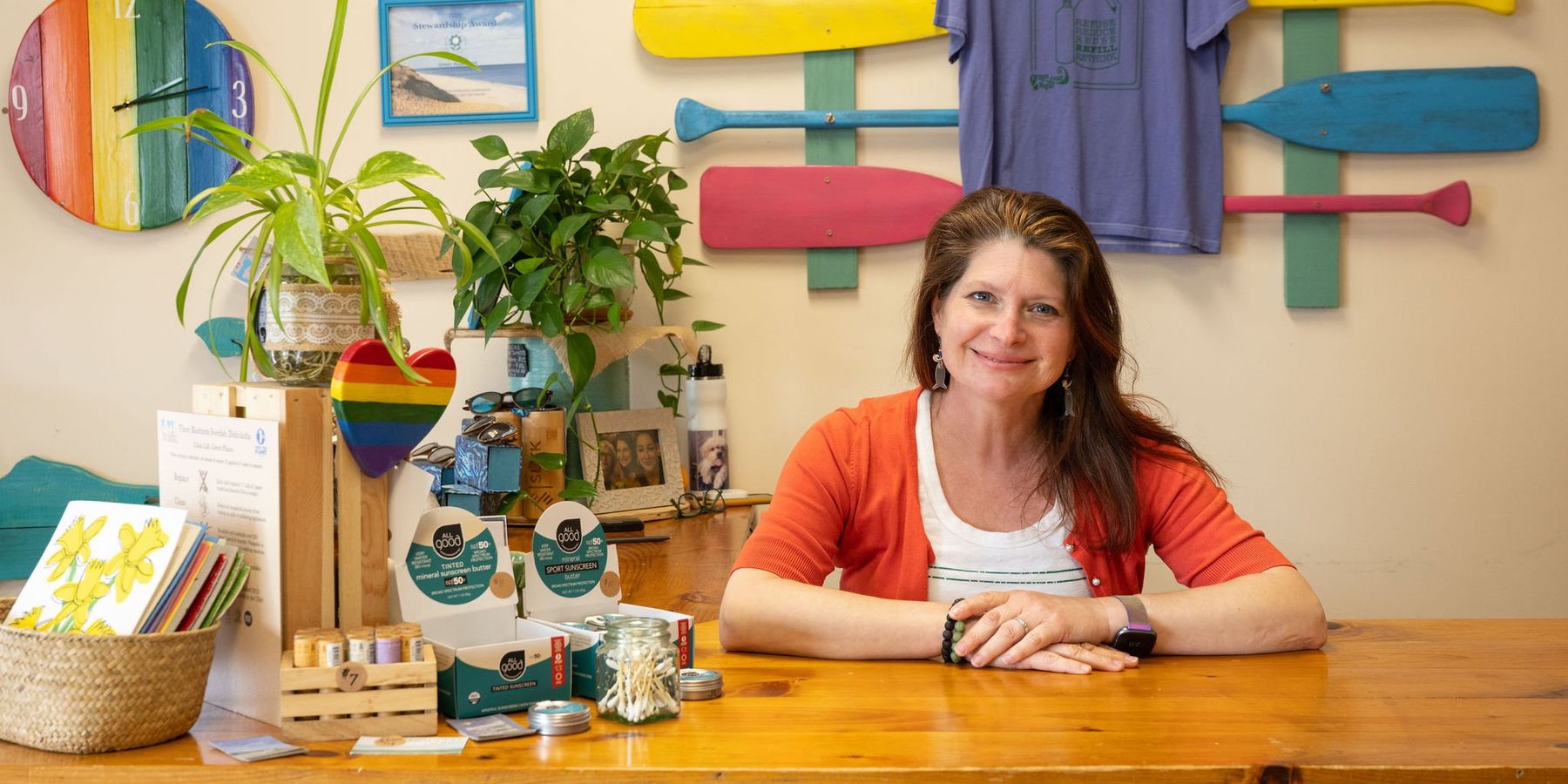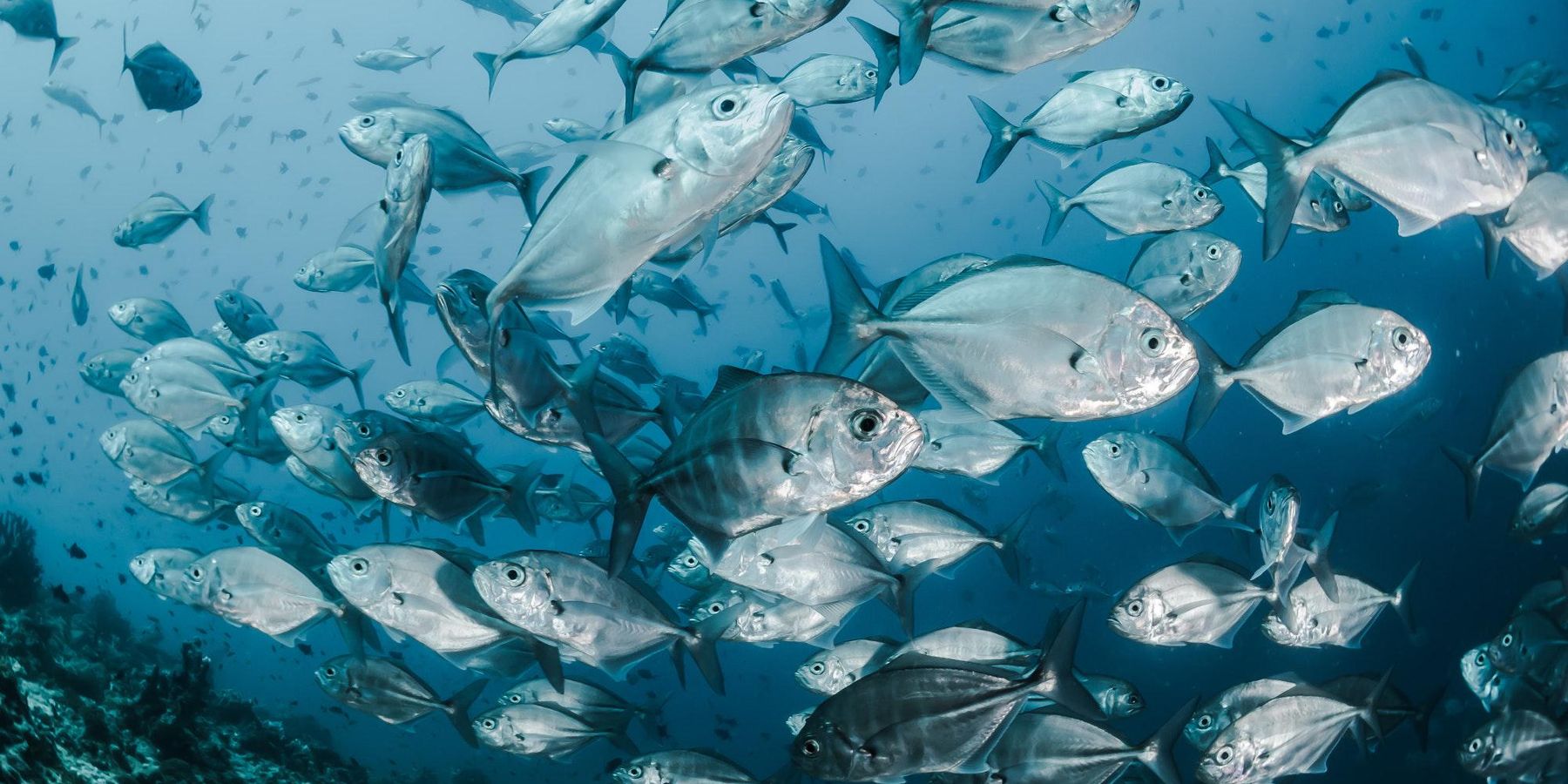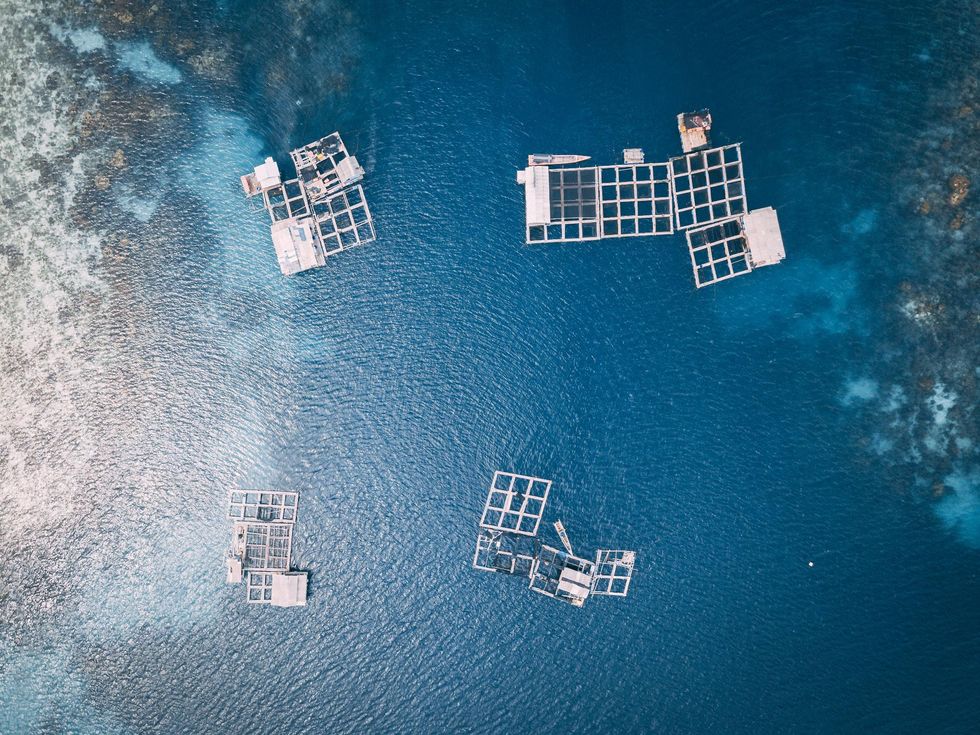Zero- and low-waste businesses band together against plastic pollution
As part of a national coalition, sustainable businesses are pooling resources to fight plastic pollution.
Jessica Georges loves the beaches of Cape Cod, Massachusetts, where she lives.
But a few years ago, she realized even the most pristine parts of town weren’t immune to plastic pollution. “You can’t walk three yards on most beach days and not run into some sort of plastic,” she told EHN. Increasingly bothered by what she saw, she created a low-waste business — Green Road Refill — to sell low-cost and low-waste goods to her community.
Now, she and other low-waste businesses are strengthening their efforts to reduce plastic pollution via the National Business Coalition for the Oceans, a nationwide organization of businesses supported by nonprofit Oceana. The coalition focuses on advancing federal, state and local policies to improve ocean health, in part by curbing single-use plastics. Businesses involved in the coalition work for plastics policy change by sending letters, signing petitions, testifying at hearings and educating customers.
“We’re really happy to be part of a coalition where others are bringing their perspectives and their solutions, and we can all join forces and create the systems change that’s necessary,” Lauren Sweeney, a coalition member and co-founder of reusable packaging company Deliver Zero, told EHN.
Plastic policy progress
Oceana’s business coalition emerged in 2021, after a partnership between Oceana, government officials and regional businesses helped ban oil and gas drilling along the Atlantic and eastern Gulf coasts. It became clear businesses voicing their concerns had the power to convince lawmakers, said Claudia Davis, the coordinator of the coalition.
The coalition provides tools to business owners to help them learn about policy issues related to the oceans and gives them accessible ways to participate in policy efforts. Davis organizes members to sign petitions, author opinion pieces to publish in news outlets, testify at hearings and meet with lawmakers about relevant legislation. Any business interested in ocean health can join. Now, 250 business owners, from diving shops to restaurants to refilleries (shops where customers can refill reusable packaging with home and personal care products), are involved.
“We really want to encourage collective action from the business community, because that's what's going to deliver policy victories that make a change for the most people,” Davis told EHN.
At the federal level, the coalition is working to pass the Break Free From Plastic Pollution Act, which would set nationwide plastics reduction targets, ban certain single-use plastic products and create a nationwide beverage container refund program.
The coalition is working to expand the number of states and local governments with similar plastic legislation.
In 2022, the coalition worked with multiple businesses in New York City to pass the “skip the stuff” law, which prohibits New York City restaurants from providing single-use plastics in takeout orders unless the customer asks. While the law will help reduce plastic pollution, it will also help restaurants save money, Davis said.
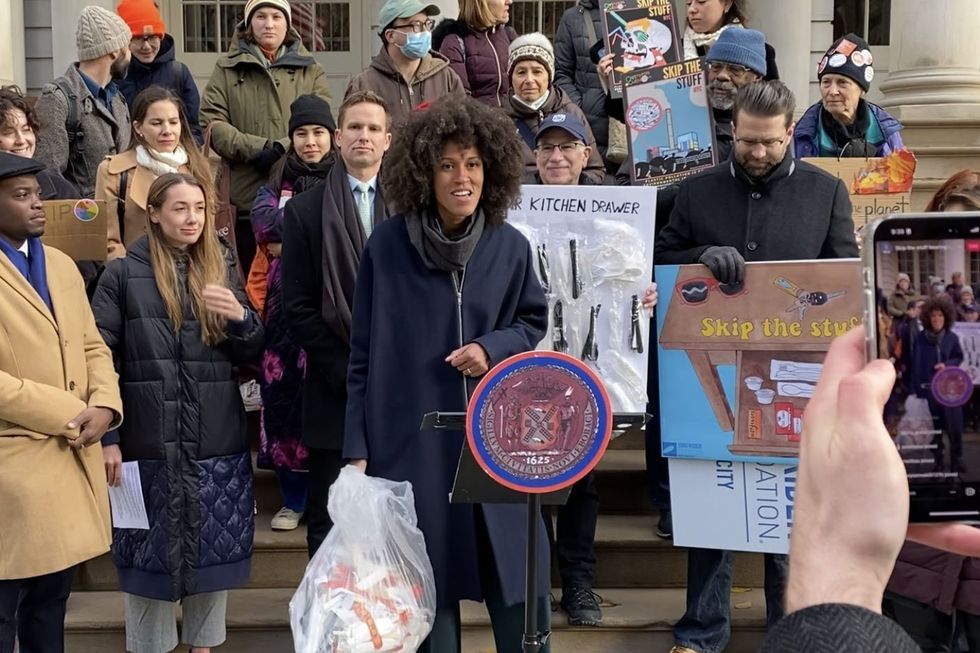
Skip the Stuff rally in NYC.
Credit: Raine Manley/NRDC
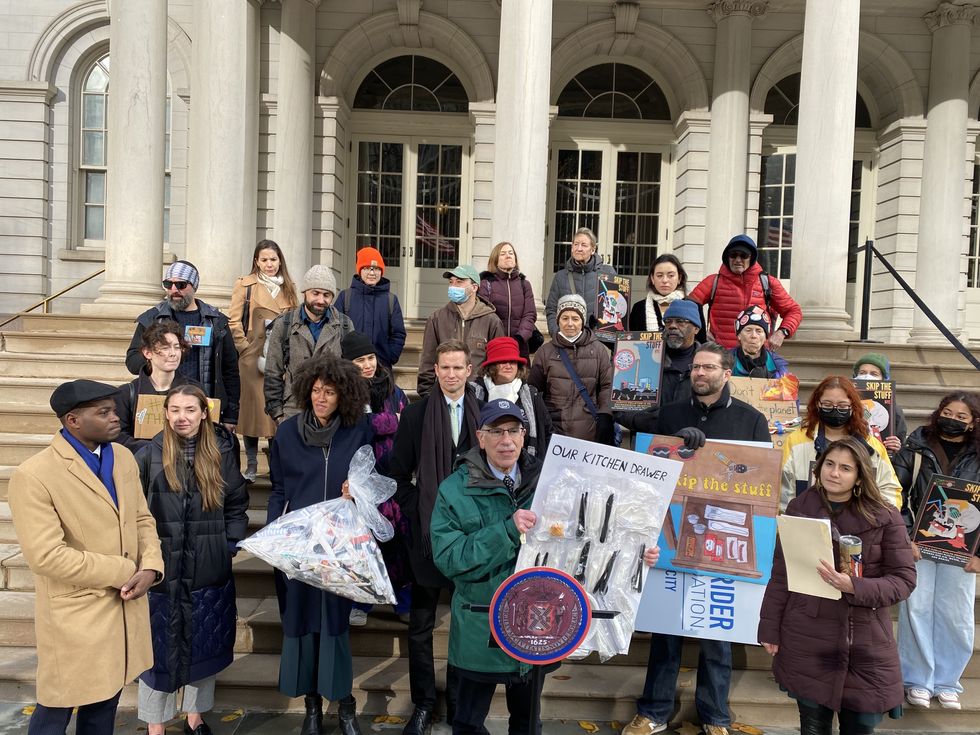
New York City's “skip the stuff” law prohibits New York City restaurants from providing single-use plastics in takeout orders unless the customer asks.
Credit: Raine Manley/NRDC
Sweeney and Larasati Vitoux, another coalition member who runs a New York City refillery called the Maison Jar, testified for the bill at a hearing in front of New York City’s Committee on Consumer and Worker Protection.
“I think it really made a difference to have members of the community who were saying “This is important to me not just as an individual, not just because I want to see less trash in my community, but [because] it's gonna save me and all of us money in the long run,”’ Davis said.
A business perspective
Low-waste businesses can provide a crucial perspective to lawmakers concerned about how policy changes will impact the economy. “Other businesses will come forward and say these bills are terrible for business,” Sweeney said. “Actually, you can run a business without polluting the planet and the oceans. The goal of these organizations is to counter the narrative that plastic reduction solutions are inherently anti-business.”
Bringing business voices to environmental advocacy work is critical, said Jennifer Congdon, deputy director for Beyond Plastics, an environmental nonprofit not involved in Oceana’s coalition. Policymakers can get a lot of reassurance from hearing that environmental policies pushed by advocates “are going to shift the economy, but they’re not going to harm the economy,” she told EHN. “There’s a path forward for economic growth.”
"You can run a business without polluting the planet and the oceans. The goal of these organizations is to counter the narrative that plastic reduction solutions are inherently anti-business.” - Lauren Sweeney, Deliver Zero
At Green Road Refill, Georges sells more than 40 plant-based products such as dish soaps, shampoos and detergents. Running a refill shop is difficult work with slim margins, said Georges and Katie Rodgers-Hubbard, who runs a similar refillery in Savannah, Georgia, called Lite Foot Company.
Bills that restrict single-use plastics give businesses like theirs a leg up by shifting the external costs of plastic like its environmental and public health harms — back to the businesses. “That makes plastic less competitive against other materials and other methods of delivering goods to people,” said Congdon.
Preventing plastic pollution
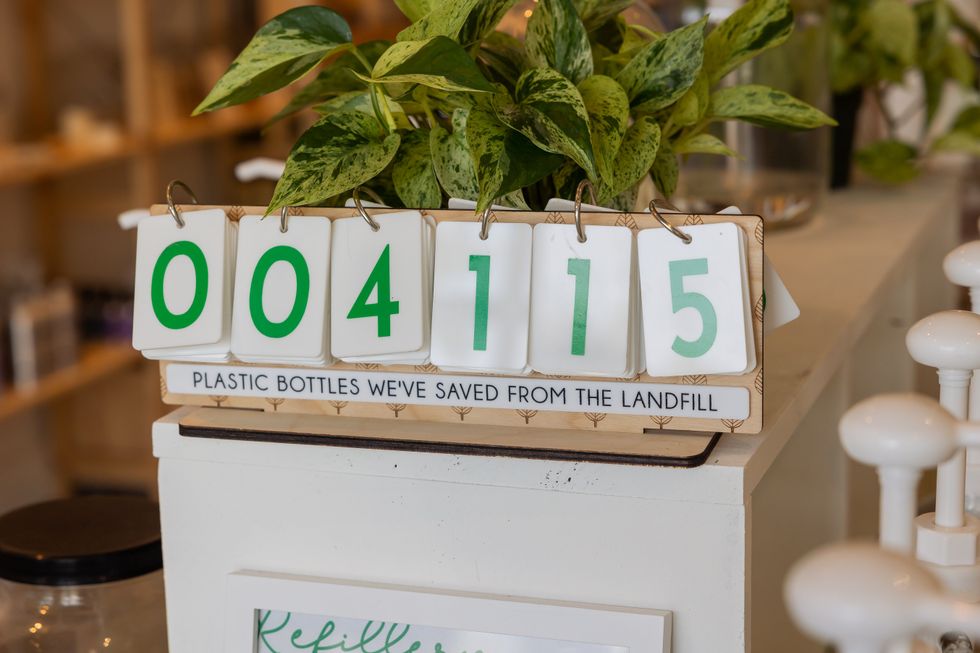
Lite Foot Company in Savannah, Georgia.
Credit: Katie Rodgers-Hubbard/Lite Foot Company
While they work toward policy action, the businesses themselves are helping to fight pollution, too. In 2023, Rodgers-Hubbard decided that running a low-waste business and joining other nonprofit efforts wasn’t enough. She started a new, nonprofit branch of her business: Lite Foot Environmental Foundation.
The foundation is creating a grade-school curriculum to educate students about plastic pollution and reuse. They also host clothing and book swaps and clothing repair days to encourage the Savannah community to extend the life of belongings. “We’re hoping to push the narrative,” Rodgers-Hubbard said. “Let’s fix things, let’s buy things of quality.”
And at Green Road Refill, Georges doesn’t only sell closed-loop products —her suppliers are closed-loop, too. She buys many of her products in 30- to 55-gallon containers from a company called Rustic Strength, which she then sends back to the company once the containers are empty. When considering what to put on her shelves, she prioritizes products with biodegradable and non-toxic ingredients.
Georges also focuses on educating customers and gives talks to libraries and elementary schools about plastic pollution. She asks everyone who gets a refill at her shop to contribute to an art installation made of non-recyclable bottle caps—a great way to start conversations about reducing one’s plastic footprint, she said. She passes information and petitions from Oceana on to customers in her monthly newsletters.
“When I first started, I had to really do a lot of work explaining what plastic was and why it's important to reduce your own plastic footprint,” she said. But now, the people who visit her shop are more familiar with refilleries and living a low-waste lifestyle.
“Businesses that exist almost for the sole purpose of reducing single use plastic are growing,” said Sweeney. “This is an exciting sector and the U.S. could develop more leadership in this sector by actually passing policy more quickly.”

